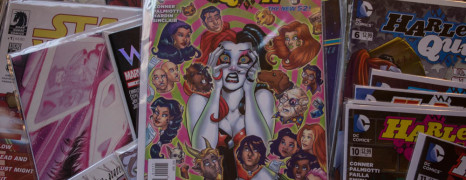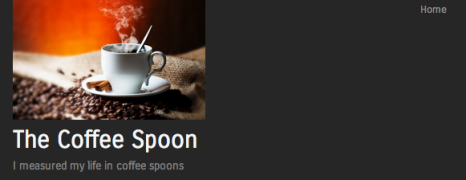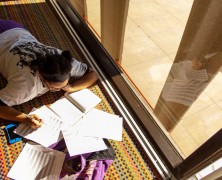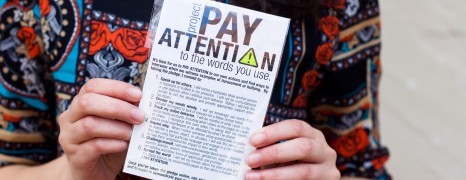Fan fiction is defined as fiction written by fans of TV series, movies or books that includes the characters of the original stories. Widely popular online, fan fiction is an area in which it seems like just about every fan has dabbled at least once or twice. Fan fiction also is a integral part of fandom communities (world wide groups of fans), and has been around since the popularization of it in 1960’s in Star Trek fanzines such as Spockanalia (1967.) Fan fiction certainly has its fans and practitioners in the Creative Writing and Literature Department, as was demonstrated recently when Amaya Garza, sophomore Creative Writing major, lead a Student Writer’s Association workshop on fan fiction. “It’s been my sort of weird dream to teach a fan fiction class,” she says with a laugh. Garza strongly believes that every writer should write or at least take a serious look at fan fiction. “Fan fiction is a useful tool to train a writer in characterization and consistency. I have always been very passionate about characters and…you have to really care about the characters you write about…So when you write fan fiction and you have to take someone else’s character and treat it as your own little thought baby and cradle it and take care of it, it kind of helps you form that bond and you can later transfer that bond to your own characters,” Garza explains. One aspect of writing fan fiction writers struggle with is keeping their versions of the characters in line with the canonical personalities. Garza believes that writing fan fiction and forcing oneself to keep truthful to a character’s essence is good practice for one’s own writing. Creative Writing freshman Chantelle Mitchell agrees with Garza. She believes fan fiction is especially helpful for screenwriting and collaborative work. “…Taking a character that’s not your own and being able to do it justice and stay true to the character while writing is an important skill to have just because in the professional world you won’t always be writing your own characters. If you’re working on a collaborative project or a screenplay or a TV show, somebody else created those characters and you have to be able to write them true to who they are as people. I think fan fiction is a good way to practice that.” Novelist and Creative Writing faculty member James Reich, however, cautions students about writing fan fiction. “If the world you write into isn’t public domain—broadly, pre-1923—you may be wasting your time,” he says. “You could call it a learning environment, but I don’t think it’s a sufficiently challenging one for a serious writer.” Fan fiction fans are aware of its critics. At her seminar, in fact, Garza asked attendees to list the things they didn’t like about fan fiction. What she found was that very few of the characteristics mentioned were exclusive to fan fiction but were rather simply elements of bad writing. “Whenever fan fiction gets a bad reputation it’s because use of cliché, bad diction and bad syntax, poor characterizing…these are all the things that people complain about but when you take a look at it in a list you realize that it’s just the elements of bad writing,” she says. It’s not that fan fiction writers aren’t good at what they do, but rather that a lot of people write fan fiction and a lot of people don’t know how to write well in general. Not everyone has a gift for literature or have the opportunity to study writing at a university. “It’s easier to blame an online community that you don’t know than to say that publishers will publish bad writing.” Reich, however, points out his concerns about the medium itself. “My anxiety about fan fiction… is that, apart from the impossibility of publishing it offline without risking a legal suit, it exists in a vacuum of wish-fulfillment and weak writing that the Internet...
Coffee Spoons Launches
posted by Zoe Baillargeon
It’s a chilly Tuesday afternoon as the staff members of SFUAD’s newest student-run online literary magazine Coffee Spoons converge on an upstairs room in Benildus Hall, shedding coats and cracking open laptops to discuss the game plan for the upcoming week. Only one submission has been made to the website so far and the staff kicks into high gear, brainstorming ways to further promote the website. “We’re hoping to accomplish a wider exposure for all writers on campus,” says Melinda Freudenberger, one of the editors, speaking of the purpose of Coffee Spoons. “We wanted something more accessible than Glyph, because Glyph is once a year and this is every month, so students have the opportunity to turn in newer work. But just as high quality work!” Amaya Hoke agrees. “We want to inspire the student body to start submitting. The idea of submitting is kind of scary, so if they can start by submitting to a student-run online magazine, it might be easier for them to submit elsewhere.” The online magazine will accept any genre of writing, as long as it is “original and coherent” according to the Coffee Spoons FAQ page, and is open to all SFUAD students, not just the Creative Writing and Literature department. “Our only chance to put work out is Glyph whereas other departments have lots of opportunities to put their work out there such as plays and film festivals, and workshops can only take you so far,” says Josiah Farris, the mastermind behind the project. “I really got committed to the idea of trying to find a way for us to find ways to get our work out there more frequently.” Although creative writing students are encouraged to submit their work elsewhere, the primary means of student publication within the department are Glyph, a yearly lit-mag written, edited, and promoted by students, and Jackalope Magazine, the weekly online magazine where students can explore journalism. The Coffee Spoons staff hopes students will be encouraged to submit due to the fast turn-around rate, the fact that submitting work for consideration is free, and that any published works may be resubmitted to “any other magazine that will accept it.” At present, the staff of Coffee Spoons includes Brandon Brown as coordinator, with Josiah Farris, Zoe Baillargeon, Marina Woollven, Serafima Fedorova, Freudenberger, and Hoke as editors. The meeting flip-flops between business and dissolving into giggly side conversations, the staff clearly having a great time working together. Farris jokes around, telling a story of how a teacher literally burning a bad essay in front of his class inspired him to become a writer. The tale sparks laughs from around the room and Brown attempts to get the meeting back on track. Once attention is redirected, everyone is engaged in presenting ideas and opinions for how to further promote the website. The name “Coffee Spoons”comes from a stanza of the T.S. Eliot poem “The Love Song of J. Alfred Prufrock,” the exact quote being “I have measured out my life with coffee spoons.” Hoke got the idea from reading the poem in Dana Levin’s 20th Century American Poetry class, replacing Farris’s original title of “A Sudden Jabberwocky.” Each member of the staff has their own reasons for wanting to be involved in the process of editing and promoting student work. “I am always really excited and really looking forward to reading what the department and students come up with,” says Marina Woollven. Freudenberger agrees, saying that she “loves the process of editing, I’m really passionate about it, and giving a wider voice to the community.” Interested students may submit work the first week of every month. If their work is accepted, students can expect a response within two weeks of publication. The overall issue will be released at the end of each month. Currently, the deadline for the November 2014 issue ends on Friday, Nov. 14, allowing students plenty...
Fogelson Library FAQ
posted by Amanda Tyler
1. Over the summer, the entire library was repurposed. The main level was transformed into an area of group study spaces for student use. “This is their library and it will only contribute to their own success,” says Margaret Van Dyk, Fogelson Library director. “The goal is to become an academic commons.” 2. There are four librarians in Fogelson who provide reference and access services to students. There are also writing tutors available, and occasional workshops held by career services. The library itself houses an impressive film and music collection, all offered in multiple formats. To support these materials, Fogelson also boasts a movie-viewing room and study rooms complete with turntables. 3. Aside from the Fogelson Gallery, the doors of the library are also opening to departmental events. In the beginning of October, the Contemporary Music Program is hosting an evening of music, in an effort to transform the space and allow students to make it their own. You can visit the Fogelson Library online or in person Monday-Thursday 8 a.m.-7 p.m. and Friday 8 a.m.-5...
SFUAD Pays Attention
posted by Zoe Baillargeon
ProjectPayAttention marks the latest social change initiative to come to SFUAD, this time prompting students to be more aware of their actions and words on social media. Following on the heels of online college safety program Think About It: Campus Clarity, which was rolled out in early September, PPA focuses on another national issue: social media bullying. “It’s a pledge to stop bullying online,” says Rachel Shuford, president of Student Voice. When signing the pledge, students swear to: speak up for others, choose their words wisely, track online behavior, inquire why, challenge yourself and spread the word. “We wanted to implement something where students know that they have the power to say ‘hey that’s inappropriate, you shouldn’t have said that,’ and it empowers the students and people to be able to stand up for themselves online and also for other people,” says Shuford. Originally started at Rutgers University following the suicide of Tyler Clementi after his roommate live-streamed Clementi’s sexual encounter with another man, the project soon spread to NYU, where resident assistants encouraged students to be more aware of what they posted online and said to others on a daily basis. According to the official PPA Tumblr page, more than 12,500 people have already signed the pledge. Now SFUAD is the latest to join the national conversation regarding online bullying and student safety. So far, more than 200 SFUAD students and faculty have signed. But student opinion of the initiative is somewhat divided. “It’s a good initiative, but it has to be dealt with carefully, because people may not take it seriously and can say things that fall on the wrong side of the line, and other problems can arise from that,” says Sandra Schonenstein, an RA who learned about PPA during Resident Assistant training. “There’s been a mixed response,” agrees Shuford. “There are students that are totally for it, and there are some students who are really confused by it, which makes sense, because it can be controversial and it was started by something that was severely controversial. But many people have taken it upon themselves to research it and learn more, and we’ve gotten a lot of positive results and no one has been openly rude or angry.” John Rodriguez, director of campus and residential life, was also thrilled by PPA’s ideals, specifically the involvement of faculty. “We all should practice what we preach, especially from a faculty and staff side. If we’re not living, eating, breathing this, how do we expect students to do the same?” Shuford stated that she does not believe bullying, either online or otherwise, to be an issue at SFUAD. “I don’t think it’s a problem, but I do think it’s something we should all learn to be a little more cautious about. We do sometimes have an issue with people speaking their minds without thinking about others, such as on the Student Life page. I’m not here to squelch anyone’s opinions, but I don’t think it’s appropriate to vocalize your opinion at the expense of another person.” In agreement, Rodriguez affirmed that to his knowledge, bullying is not an issue at SFUAD, but that it should be addressed before it could escalate to that point. “If just one of these initiatives helps one person or even saves one person’s life, then we’ve done our jobs. We just want everyone to be safe.” When asked how signing the pledge had affected her social media presence, Shuford said that the initiative has empowered her to stand up for others whom she sees being discriminated against around campus or online. She also urged students to sign the pledge, and then go by Mouton to pick up their complimentary PPA wristband, magnet, and sticker. “This is a great time in student’s lives to say, ‘think about it, talk about it, pay attention to what’s going on,” says...





 Jackalope Magazine is the student magazine of Santa Fe University of Art and Design. Building on the interdisciplinary nature of our education, we aim to showcase the talent of our university and character of our city.
Jackalope Magazine is the student magazine of Santa Fe University of Art and Design. Building on the interdisciplinary nature of our education, we aim to showcase the talent of our university and character of our city.
Recent Comments